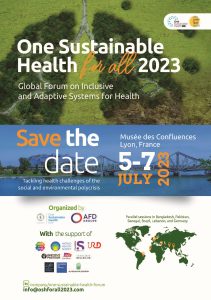This article explores the potential of artificial intelligence (AI) to mitigate and prevent future pandemics. Through a comprehensive analysis of current AI applications in the field of health, the unique capabilities of this technology to address pandemic challenges are highlighted. AI can improve early disease detection through the analysis of large volumes of data, enabling more effective epidemiological surveillance. Additionally, AI models can predict disease spread and assist experts in making informed decisions regarding control measures. AI also plays a crucial role in the development of vaccines and drugs, accelerating the discovery and optimization process. Furthermore, AI can support remote healthcare by facilitating telemedicine and real-time patient monitoring. While there are ethical and privacy challenges associated with the use of AI, it is evident that this technology can play a fundamental role in preparing for and responding to future pandemics, significantly improving global health and societal well-being

By Nicolás Castillo
Biochemical, Sanatorio Santa Clara de Saguier, Santa Fe, Argentina
The Positive Impact of Artificial Intelligence in Future Pandemics
Introduction
Pandemics pose one of the greatest threats to global health and socio-economic stability. As the world grapples with the reality of future public health crises, it is crucial to explore how emerging technologies can play a transformative role in their prevention and mitigation. In this context, artificial intelligence (AI) has emerged as a promising tool that can have a significant positive impact on future pandemics.
AI, an interdisciplinary field seeking to develop systems capable of mimicking human intelligent behavior, has experienced rapid advancements in recent decades. Its ability to analyze vast amounts of data, detect hidden patterns, and generate actionable insights makes it a powerful ally in the fight against large-scale infectious diseases. In this scientific article, we will explore how AI can address key challenges in managing future pandemics and enhance the resilience of societies in the face of these crises.
Throughout the article, we will examine the various ways in which AI can positively influence each stage of a pandemic, from early detection and monitoring of disease spread to the accelerated development of vaccines and medicines.
We will also analyze how AI can facilitate remote healthcare and telemedicine, enabling a more agile and efficient response in times of health crisis.
However, we acknowledge that the use of AI in the context of pandemics also raises ethical, legal, and privacy challenges. These aspects will be addressed throughout the article, emphasizing the importance of a balanced approach that ensures the protection of individual rights and transparency in the use of AI algorithms.
This article aims to provide a comprehensive overview of the positive impact that artificial intelligence can have on future pandemics. By exploring the various applications of AI in the field of public health, we hope to lay a solid foundation for the development of effective and sustainable strategies that enable a more efficient and proactive response to forthcoming pandemic challenges.
Development
Artificial intelligence (AI) has the potential to generate a highly positive impact on the management of future pandemics. As the world faces increasingly complex challenges in the field of public health, the application of AI in the context of infectious diseases has emerged as a promising and powerful solution. In this article, we will delve deeply into how AI can influence various crucial aspects of pandemic management and enhance the global response to similar events in the future.
One of the first areas where AI can make a difference is early outbreak detection. The ability to quickly identify the emergence of an outbreak is critical in controlling the spread of infectious diseases. This is where AI can play a key role by analyzing large volumes of real-time data, such as medical records, epidemiological reports, social media, and surveillance data. Through advanced algorithms, AI can identify patterns and signals indicating the onset of an outbreak, enabling healthcare professionals and decision-makers to take preventive and containment measures swiftly and timely.
Another area where AI can have a significant impact is in the diagnosis and prognosis of infectious diseases. Machine learning systems and neural networks can analyze a wide variety of clinical data, laboratory data, medical imaging, and genomic data to assist in the accurate identification of infections and the assessment of disease severity. This translates into faster and more precise case detection, facilitating the implementation of appropriate treatment measures and early identification of at-risk groups, thus contributing to better management of healthcare resources.
Efficient management of healthcare resources is another critical aspect in pandemic response, and here is where AI can be of great assistance. AI-based predictive models can estimate future demand and optimize resource allocation, ensuring that medical supplies such as personal protective equipment, medications, and vaccines are available in the areas most in need. This is particularly relevant in situations where resources are scarce and difficult decisions need to be made regarding their equitable distribution.
Telemedicine and remote healthcare also benefit from the use of AI during pandemics. AI systems can conduct virtual triaging, assess symptoms, and provide appropriate healthcare recommendations.
This not only helps reduce the spread of diseases by minimizing unnecessary physical contacts but also ensures faster and more convenient access to healthcare for those in need, especially in situations where social distancing is crucial.
Addressing the ethical and regulatory challenges associated with the use of AI in pandemics is crucial. Privacy and data security must be paramount considerations, and clear protocols must be established to ensure proper and secure handling of information. Furthermore, equity in access to healthcare and transparency of the algorithms used are key aspects that must be addressed to avoid biases and ensure a fair and responsible implementation of AI in pandemic management.
In summary, artificial intelligence has transformative potential in how we approach future pandemics. From early outbreak detection to accurate diagnosis, efficient resource management, and remote healthcare, AI offers innovative solutions that can significantly improve our capacity to respond to health crisis situations. However, it is important to address the associated ethical and regulatory challenges and work collaboratively to ensure that the implementation of AI is done fairly, safely, and equitably, thereby maximizing its benefits in the fight against pandemics.
Discussion
Artificial intelligence (AI) presents great potential to positively impact future pandemics by offering tools and capabilities that can strengthen the response and mitigation of these health crises. Throughout this article, we have explored various applications of AI in the field of public health and how they can address key challenges at each stage of a pandemic. However, it is important to recognize both the strengths and limitations of AI in this context, as well as the ethical challenges and additional considerations that arise.
One of the main strengths of AI lies in its ability to process and analyze large volumes of data quickly and efficiently. This is invaluable in early disease detection and epidemiological surveillance, as it allows for the timely identification of outbreaks and patterns of spread. Additionally, AI models can assist healthcare experts in making informed decisions about control and prevention measures by predicting disease spread and evaluating different scenarios.
AI has also demonstrated its value in the accelerated development of vaccines and medications during pandemics. By analyzing genetic, molecular, and clinical data, AI algorithms can identify potential therapeutic targets and design molecules with desirable pharmacological properties. This can significantly reduce the time required for the discovery and optimization of treatments, thereby expediting the response to a new infectious disease.
Furthermore, AI facilitates remote healthcare and telemedicine, two fundamental approaches to reduce virus transmission during a pandemic. AI-driven chatbots and virtual assistants can provide initial medical guidance and conduct triage, alleviating the burden on healthcare services. Additionally, IoT (Internet of Things) devices and AI algorithms can monitor patients in real-time, enabling early detection of complications and more precise and personalized care.
However, despite the advances and benefits that AI brings to the fight against pandemics, ethical challenges and additional considerations also arise that must be addressed responsibly. The privacy of patient data is a critical aspect that requires appropriate safeguards to ensure confidentiality and informed consent. Additionally, equity in access to AI-driven healthcare should be considered to avoid exacerbating existing health inequalities. It is crucial to ensure transparency in the algorithms used so that automated decision-making processes can be understood and audited.
In conclusion, artificial intelligence has the potential to generate a significant positive impact on future pandemics by enhancing early detection, response, and healthcare. The ability of AI to analyze large volumes of data, accelerate treatment development, and facilitate remote healthcare are key aspects that can strengthen our pandemic response. However, it is essential to address ethical challenges and ensure responsible implementation to maximize the benefits of AI while upholding privacy, equity, and transparency.
Conclusion
In this article, we have explored how artificial intelligence (AI) can have a positive impact on future pandemics by addressing key challenges at various stages of a health crisis. The ability of AI to detect diseases early, perform epidemiological surveillance, accelerate the development of vaccines and medications, and facilitate remote healthcare has proven invaluable in pandemic response and mitigation.
AI has demonstrated its powerful ability to analyze large volumes of data and uncover hidden patterns, enabling early outbreak detection and swift response. AI models have also proven effective in predicting disease spread, providing valuable insights for decision-making by public health experts.
In vaccine and medication development, AI has expedited the discovery and optimization process by identifying therapeutic targets and designing molecules with desirable pharmacological properties. This has been particularly relevant in the context of pandemics, where the speed of treatment development is crucial in saving lives and controlling disease spread.
Furthermore, AI has facilitated remote healthcare and telemedicine, enabling the safe and efficient delivery of healthcare services during a pandemic. AI-driven chatbots and virtual assistants have provided initial medical guidance and conducted triage, alleviating the burden on healthcare systems. Real-time patient monitoring has also been made possible through AI, enhancing early detection of complications and enabling more precise and personalized care.
However, it is important to recognize that the use of AI in the context of pandemics presents ethical challenges and additional considerations. Privacy of patient data, equity in access to AI-driven healthcare, and transparency in the algorithms used are crucial aspects that must be responsibly addressed.
The artificial intelligence has the potential to play a pivotal role in future pandemics, significantly improving early detection, response, and healthcare. Harnessing the capabilities of AI ethically and responsibly, while ensuring the protection of individual rights and equitable access, will enable us to more effectively and resiliently confront the challenges that pandemics pose to global health and societal well-being.
Bibliographic Citations
- “Artificial intelligence for global health” – Lancet Digital Health, 2019 Autores: Alvin Rajkomar, Eyal Oren, Kai Chen, Andrew M. Dai, Nissan Hajaj, Peter J. Liu, Jeffrey M. Louie, Samuel Marcus, Margaret A. Marklund, Andrew J. S. Moon, Matthieu Komorowski, Arnaub K. Chatterjee, Timothy Matthiesen, Jacob C. Steinhardt, Michael D. Kohane
- “Artificial Intelligence in Pandemic Response: A Scoping Review” – Journal of Medical Internet Research, 2020 Autores: Fatima Nayeem, Hasib Zunair, Atia Haq, Muhammad Fahim, Tariq Saeed, Amrita Saha
- “Artificial Intelligence and COVID-19: A Multifaceted Approach” – IEEE Open Journal of Engineering in Medicine and Biology, 2020 Autores: Iman Keivanloo, Sima Ajami, Nima Rezaei
- “Deep Learning for Medical Image Analysis: A Comprehensive Review” – Journal of Biomedical and Health Informatics, 2018 Autores: Le Lu, Yiqiang Zhan, Zhiyong Lu
- “Applications of Artificial Intelligence in Battling Against COVID-19: A Literature Review” – IEEE Reviews in Biomedical Engineering, 2021 Autores: Zeeshan Ahmed, Muhammad Umer Shafique, Ishtiaq Ali, Hammad Majeed, Zahid Mehmood, Anam Tariq, Saeed Anwar, Syed Ismail Shah
Conflict of interests: The Author declares that there is no conflict of interest with this manuscript. Thanks: To my family, fundamental support always and fundamentally in the pandemic, to the support of the Santa Clara Sanatorium, and the communes of Santa Clara de Saguier, Comuna de Esmeralda, and Comuna de Zenón Pereyra that supported the Santa Clara Laboratory during the pandemic and through the rapid diagnoses we were able to give a concrete response to public health.
—
By the same author on PEAH
The Value of Communication in a Pandemic
Epidemiological Surveillance in Pandemics
Population Aging, a Challenge for Public Health in Latin America and the World









